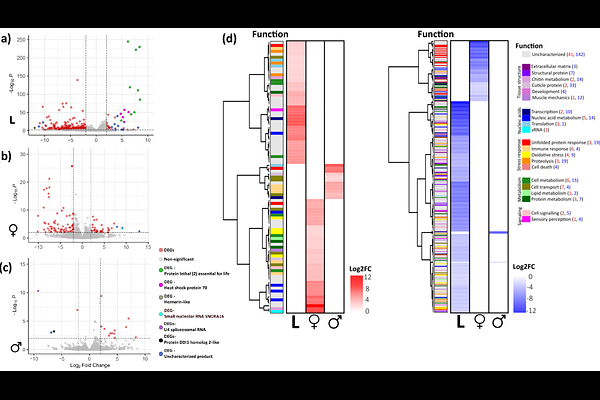Do heatwaves impact mosquitoes? Multi-level analyses across developmental stages in Aedes albopictus

Do heatwaves impact mosquitoes? Multi-level analyses across developmental stages in Aedes albopictus
Alfaro, C.; Lozada Chavez, A. N.; Khorramnejad, A.; Kropf, A.; Catapano, P. L.; Cappelli, A.; Damiani, C.; Favia, G.; Bonizzoni, M.
AbstractThe increase in the frequency and intensity of heatwaves (HWs) under global warming is expected to have more dramatic biological impacts on insects than mean temperature increases by challenging their thermal thresholds. However, experimental evidence that quantifies the impact of HWs on insects in their ecological context is limited. Here, we measured across multiple biological scales (e.g. fitness, physiology, transcriptomic and microbiota) the stage-specific responses of the arboviral vector Aedes albopictus when experiencing an ecologically relevant HW. In arboviral vectors, only females require a blood-meal thus contributing to the transmission cycle, but males, eggs and larvae can also be the target of control strategies to reduce population size. As such the understanding of the responses to a HW during mosquito development has both biological and epidemiological relevance. We observed stage-specific responses, starting at the egg stage. We saw egg hatching decreasing and delaying after HW exposure. On the contrary, larvae showed to be resilient to HW. Larvae repurposed their energy resulting in trivial mortality, but delayed development. At the adult stage, we observed a marked sex difference, with extensive (>50%) male mortality, accompanied by a small (16) number of genes elicited following HW exposure, which indicates that males have limited coping mechanisms against hot events. In females, we observed a reduced reproductive output, but only when HW occurred after a blood-meal. Finally, we saw extensive HW-dependent changes in the microbial composition of larvae, but female microbiota remained dominated by Wolbachia regardless of the thermal challenge. Our results have relevant implications for both the understanding of mosquito biology and the implementation of vector control strategies as the climate crisis progresses.